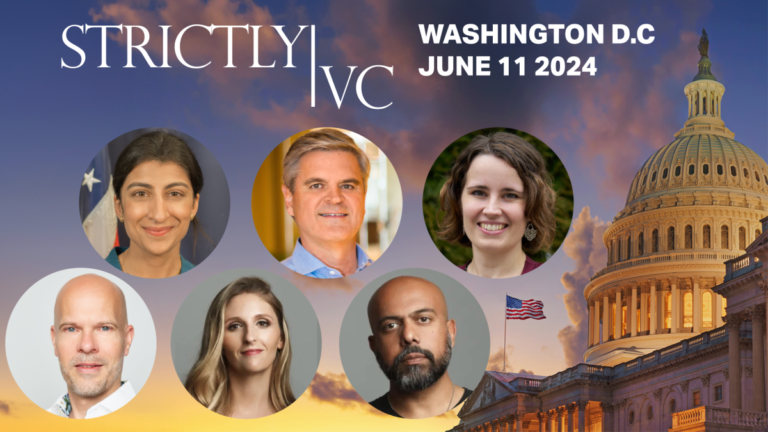
When generative AI tools started making waves in late 2022 after the launch of ChatGPT, the finance industry was one of the first to recognize these tools’ potential for speeding up the data-gathering and research process.
MIT alumni Jacob Chanyeol Choi and Subeen Pang founded Linq after they won the Samsung Open Collaboration in 2023, an accelerator-like program hosted by Samsung Financial Network.
Choi told TechCrunch that win spurred him to build large language models (LLMs) for enterprises, particularly the financial sector.
“We knew the potential for a tool that could seamlessly integrate with a company’s data ecosystem, which led to the birth of Linq,” Choi said.
In addition to its B2B service for enterprise clients, the startup also plans to build B2C tools for AI equity research.

Now, we’re headed to Washington, D.C., for another night of top-notch interviews and unparalleled networking, all at the cozy Woolly Mammoth Theatre on Tuesday, June 11.
Lina Khan – Chair, Federal Trade CommissionAs Chair of the Federal Trade Commission, Lina Khan brings a wealth of experience and expertise to the table.
With a background in business reporting and antitrust research, Khan has dedicated her career to addressing consolidation across various markets.
Steve Case – Chairman & CEO, RevolutionSteve Case is known for his pioneering efforts, such as founding AOL, and integrating the internet into everyday life.
Secure Your Spot:Tickets for StrictlyVC Washington, D.C., are priced at $159, offering exceptional value for an evening packed with exclusive content and networking opportunities.

Efforts by tech giants to be more transparent about the ads they run are — at very best — still a work in progress, according to a report looking at ads transparency tools.
The report’s top-line conclusion is that platforms’ ad oversight tools are falling short of delivering the intended transparency and democratic accountability in a critical year for elections globally.
Judging by the report findings, something similar may be playing out in platforms’ early responses to DSA demands for ads transparency.
“Major gaps”They do note there has been some developments since they carried out their transparency tools tests.
But, as the report suggests, it’s all too easy for platforms to inject intentional friction into transparency tools, whether by restrictive design or sloppy implementation or both.

The study builds on earlier work investigating his impact on online speech by spotlighting how policy changes Musk enacted are actively rewarding hate speech posters with increased reach, engagement and even direct payouts through X’s subscriber feature.
Some of the accounts pivoted to war hate posts after previously posting COVID-19-related conspiracy theory content, per the report.
The CCDH found these accounts were able to boost their reach on X after posting hateful content targeting the war.
But not all: The CCDH found ads being served alongside hateful posts made by all the tracked accounts.
“We found ads for Oreos, the NBA, the FBI and even X itself placed near hateful posts,” it wrote.

The main development out of the sixth TTC meeting appears to be a commitment from EU and US AI oversight bodies, the European AI Office and the US AI Safety Institute, to set up what’s couched as “a Dialogue”.
The aim is fostering a deeper collaboration between the AI institutions, with a particular focus on encouraging the sharing of scientific information among respective AI research ecosystems.
“Working groups jointly staffed by United States science agencies and European Commission departments and agencies have achieved substantial progress by defining critical milestones for deliverables in the areas of extreme weather, energy, emergency response, and reconstruction.
We are also making constructive progress in health and agriculture.”In addition, an overview document on the collaboration around AI for the public good was published Friday.
The joint statement refers to 2024 as “a Pivotal Year for Democratic Resilience”, on account of the number of elections being held around the world.

Gómez’s research is grounded in the computational music field, where she contributes to the understanding of the way humans describe music and the methods in which it’s modeled digitally.
What I liked at the time from machine learning was its modelling capabilities and the shift from knowledge-driven to data-driven algorithm design — e.g.
There’s also PHENICX, a large European Union (EU)-funded project I coordinated on the use of music; and AI to create enriched symphonic music experiences.
What advice would you give to women seeking to enter the AI field?
They should learn about the working principles and limitations of AI algorithms to be able to challenge them and use them in a responsible way.

Last year, Salesforce, the company best known for its cloud sales support software (and Slack), spearheaded a project called ProGen to design proteins using generative AI.
“Many drugs — enzymes and antibodies, for example — consist of proteins,” Madani said.
Fed into a generative AI model, data about proteins can be used to predict entirely new proteins with novel functions.
Other companies and research groups have demonstrated viable ways in which generative AI can be used to predict proteins.
And DeepMind, Google’s AI research lab, has a system called AlphaFold that predicts complete protein structures, achieving speed and accuracy far surpassing older, less complex algorithmic methods.

A federal judge sided against Elon Musk today, dismissing a lawsuit brought by Musk and X that targeted a nonprofit that researches online hate.
In the lawsuit, X claimed that it lost “tens of millions of dollars” as a direct result of the CCDH’s research.
Musk, who personally directed the lawsuit, called the CCDH “an evil propaganda machine” in replies on X.
The nonprofit, formed in 2018, researches trends in hate speech, extremism and misinformation on major social networks.
Unlike the CCDH lawsuit, X is suing Media Matters for America in Texas, which doesn’t share California’s protections against frivolous lawsuits designed to stifle free speech.

Sarah Kreps is a political scientist, U.S. Air Force veteran and analyst who focuses on U.S. foreign and defense policy.
She’s a professor of government at Cornell University, adjunct professor of law at Cornell Law School and an adjunct scholar at West Point’s Modern War Institute.
Kreps’ recent research explores both the potential and risks of AI tech such as OpenAI’s GPT-4, specifically in the political sphere.
In an opinion column for The Guardian last year, she wrote that, as more money pours into AI, the AI arms race not just across companies but countries will intensify — while the AI policy challenge will become harder.
Developing AI in these publicly interested way seemed like a valuable contribution and interesting interdisciplinary work for political scientists and computer scientists.

However, harvesting stem cells is a controversial process, since a major method involves harvesting during pregnancy.
To date, most stem cells are harvested from adult stem cells or post-termination foetal tissue.
Cellcolabs will specialize in Mesenchymal stem cells (MSCs), which are scarce and expensive.
In an interview with TechCrunch, Bernow said, “The promise of stem cells or what it holds, is really mind boggling.
“We’ve built this facility, which we believe is one of the world’s largest facilities, solely dedicated for production of this kind of stem cell.













